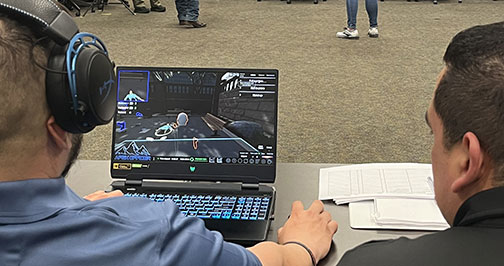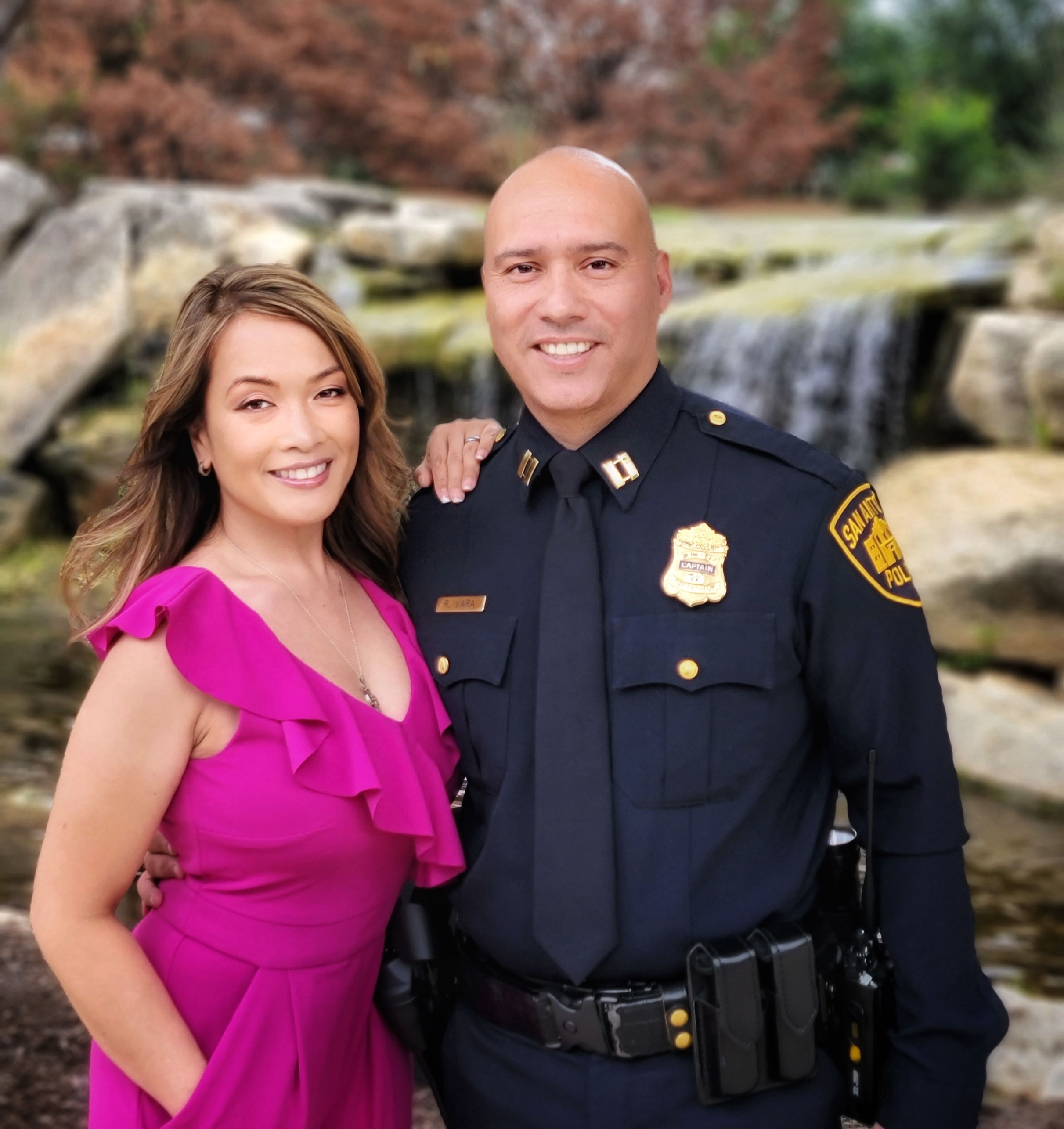Posted on April 11, 2024 by Amanda Cerreto

Virtual reality policing
As technology – especially interactive, machine-based systems – continues to grow, a UTSA alumnus knew it was time for his profession to become part of the trend.
SAPD Captain Robert Vara, who holds two UTSA degrees: a bachelor’s degree in criminology and criminal justice and a Master of Public Administration, currently serves as commander of the San Antonio Police Training Academy. Because of his work, the Academy now boasts a state-of-the-art virtual training system to teach cadets the art of de-escalation.
“The best part of my work is that I get to have a hand in training future police officers,” Vara said. “I’m able to build the curriculum and really be a servant leader.”
 Vara has held roles in the Training Academy since 2020, first as an Assistant Commander and now as Commander. In this era of hybrid work environments, Vara has taken the lead on virtual learning. He applied for federal grants to secure a virtual reality system, which cadets use as a tool for de-escalation.
Vara has held roles in the Training Academy since 2020, first as an Assistant Commander and now as Commander. In this era of hybrid work environments, Vara has taken the lead on virtual learning. He applied for federal grants to secure a virtual reality system, which cadets use as a tool for de-escalation.
The Apex Officer Training System is a state-of-the-art virtual reality tool, allowing cadets to train for high-stress scenarios with real-time reactions and responses. SAPD officers control each scenario, talking to cadets in the role of the potential perp and of dispatch. With life-like graphics and sounds, trainees are fully immersed in the experience, honing their decision-making skills and responses in a safe and controlled setting.
Once the scenario is over, the cadets watch it, reset, and repeat, until de-escalation tactics are ingrained as a natural response. Because of this, new cadets can feel more prepared for the situations they are likely to face in the real world on patrol.
While cadets train primarily in person – an average of 180 cadets earn more than 1,400 hours of training per year in the facility – the virtual aspect of learning that began in the pandemic is something that Vara continues to employ today.
Active law enforcement officers are required to obtain continuous certifications and take continuing education courses. Prior to the pandemic, both instructors and officers had to be pulled from their daily patrol or day-to-day work to take these courses at the academy. Now, however, Vara has pushed for a hybrid model, freeing up time and enabling officers to stay consistent with their work schedules.
A major challenge — but also part of the joy of his work — is finding the right people to go through the academy. They are certainly not at a shortage of applications, but they are determined to go through each and every one to determine the right applicant.
“When we look at applicants, we want a person who has character and a strong values system,” Vara said. “The community wants to know who can help them, and so our officers need to have that servant heart. A first impression on a civilian is long-lasting.”
Vara completed his undergraduate degree in criminology and criminal justice in 2001. After working his way up from patrolman to detective to a supervisor, he knew it was time to return to school to obtain his advanced degree.
“UTSA is a big part of who I am,” Vara said. “As a First-Generation student, there has never been another option.”
 He enrolled in the Master of Public Administration program, where he coincidentally earned his degree alongside now Chief of UTSA Police, Stephanie Schoenborn. The program, he said, boosted his leadership skills and allowed him to think outside the box when it came to innovation, safety and policing.
He enrolled in the Master of Public Administration program, where he coincidentally earned his degree alongside now Chief of UTSA Police, Stephanie Schoenborn. The program, he said, boosted his leadership skills and allowed him to think outside the box when it came to innovation, safety and policing.
“Learning side by side with Commander Vara was a unique opportunity during the MPA program,” said Stephanie Schoenborn, chief of the UTSA Police Department. “At that time, there were very few law enforcement officers in the MPA program so there was a natural camaraderie that connected us through similar experiences and challenges. Law enforcement continues to evolve through innovation and education and UTSA is at the forefront, developing future leaders.”
Although he is bolstered by his recent successes, Vara is still taking steps to continuously improve the processes of the training academy. This includes a push to digitizing applications and files, continuously meeting with patrol supervisors to determine the greatest needs for training and rigorous training for detectives to ensure that those who promote up can handle the duties.
“The goal is to make all training less restrictive and more applicable to the work we do,” Vara said. “And of course, to continuously keep the community in mind. We are here to serve them.”

